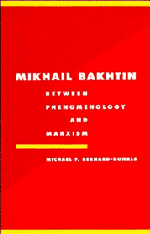Book contents
- Frontmatter
- Contents
- Preface
- Acknowledgments
- Abbreviations
- 1 Problems with Formalism
- 2 Neo-Kantianism and Bakhtin's phenomenology
- 3 Reception and hermeneutics: the search for ideology
- 4 The Marxist texts
- 5 Science and ideology
- 6 Science, praxis, and change
- 7 Bakhtin, the problem of knowledge, and literary studies
- Bibliography
- Index
6 - Science, praxis, and change
Published online by Cambridge University Press: 03 May 2011
- Frontmatter
- Contents
- Preface
- Acknowledgments
- Abbreviations
- 1 Problems with Formalism
- 2 Neo-Kantianism and Bakhtin's phenomenology
- 3 Reception and hermeneutics: the search for ideology
- 4 The Marxist texts
- 5 Science and ideology
- 6 Science, praxis, and change
- 7 Bakhtin, the problem of knowledge, and literary studies
- Bibliography
- Index
Summary
In the current conception of the human sciences, there exists a peculiar notion of how knowledge is possible and functions to produce a “worldview” (or, in other terms, a way of living). In this view, pluralism and multivalence are held sacrosanct, while the notion that there can be any appeal to some certainty outside of the multivalent has been overthrown. In the current political climate that exists in the world of academe, symptoms of this view include accusations of both the left and the right that Western culture (the right) and the multivalent text (the left) are in a sense just appeals to some higher certainty which is impossible to judge better or worse than any alternative, and unattainable in any case (since, if such “higher values” are no better or worse than anything else, they are not really any “higher” than anything else – it is not what we think it is). At universities, student codes of conduct draw lines between what is allowable speech (say, for example, a discussion of racism that includes epithets commonly used to denigrate women, homosexuals and people of color) and what is grounds for expulsion from the university (say, using the same kinds of epithets at a rally held by the Nation of Islam or by the B'nai B'rith). Again, it is the current view that such lines simply cannot (or should not) be drawn because the different interpretations of what is and is not acceptable are equally valid in an anti-foundationalist world.
- Type
- Chapter
- Information
- Mikhail BakhtinBetween Phenomenology and Marxism, pp. 135 - 158Publisher: Cambridge University PressPrint publication year: 1995

